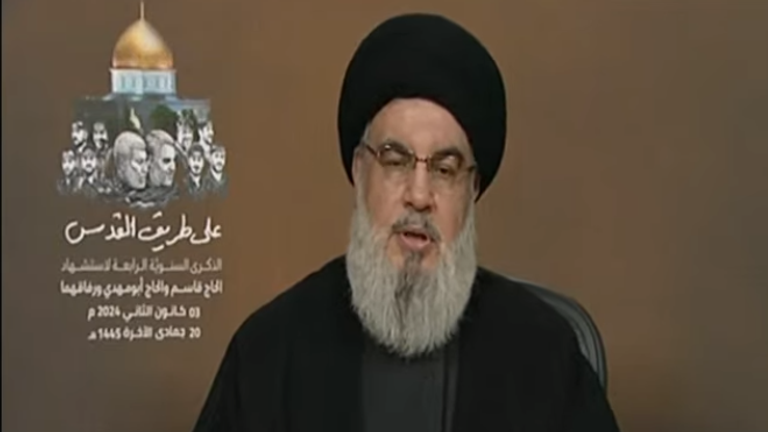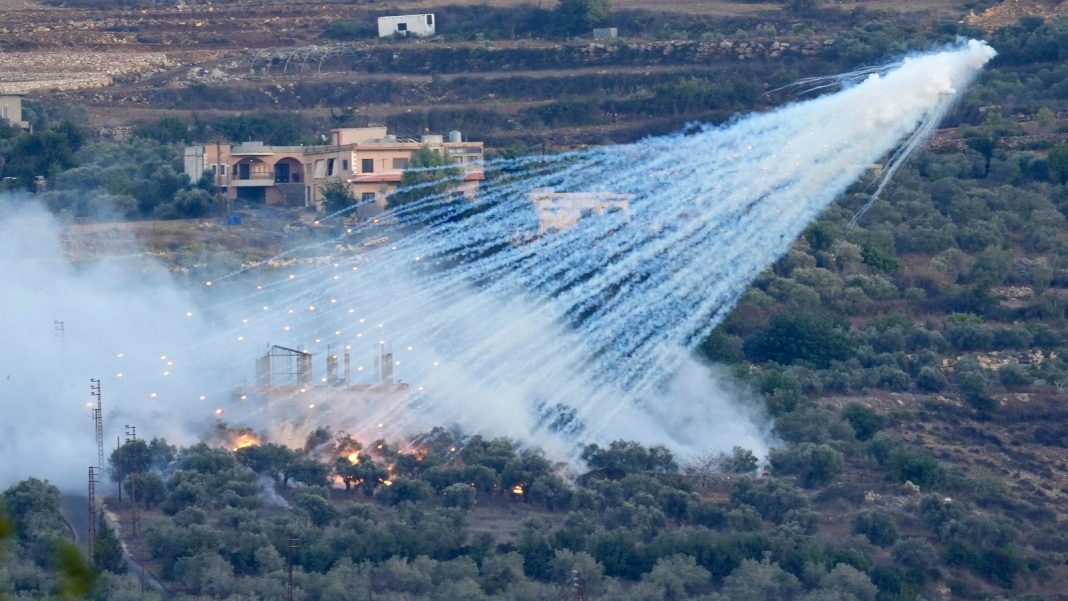Since the beginning of 2024, an Israeli airstrike has killed a senior Hezbollah commander in Lebanon, the militant group has struck an Israeli base with explosive drones, and Israel has assassinated the deputy leader of Hamas in Beirut.
Tensions between Israel and the Iran-backed Hezbollah militant group have been ratcheting up since Hamas launched its attack across the Gaza border on 7 October, increasing the risk a wider war could be unleashed across the region, potentially drawing in Iran and its arch-rival the US.
“The Israeli leadership is playing with fire,” warned Rym Momtaz, a consultant research fellow at the International Institute for Strategic Studies (IISS), who told Sky News tensions are the highest they have been since the Israel-Hamas war began.
“An escalation with Hezbollah can never be completely controlled and could lead to a war that will be many times over more devastating and lethal than the war with Hamas in Gaza,” she said.
Israel-Gaza war latest updates
Do escalating tensions increase the chance of all-out war?
Hezbollah and Israeli forces have been exchanging regular fire across the border since the Hamas attack three months ago, in clashes that have killed six civilians and 12 troops on the Israeli side, according to the AP news agency, and at least 150 Hezbollah fighters and 20 civilians in Lebanon, according to Hezbollah.
Tens of thousands on both sides have fled the area.
“The levels of violence we’re seeing are at a level we haven’t seen since 2006” when the two sides last went to war, said Dr Tobias Borck, a senior research fellow at the Royal United Services Institute (RUSI).
He said the “real threat” of escalation increases the risk of miscalculation between the opposing sides, which could see Hezbollah deploy its stockpile of between 100,000 to 150,000 missiles, which he described as being “a bit further advanced than what Hamas has”.
Read more:
Senior Hezbollah commander killed in Israeli airstrike
Hamas blames Israel for ‘cowardly assassination’ of deputy leader
What is Hezbollah?
Hezbollah is an Iran-backed Islamist political party and militant group in Lebanon that has pledged to destroy the state of Israel.
It was founded in the maelstrom of the Lebanese civil war, which lasted for 15 years between 1975 and 1990, when Iran saw an opportunity in the region to fund the group to fight Israel, which had invaded and occupied the country.
Tensions between Israel and Hezbollah remained high despite Israel eventually pulling out of Lebanon and erupted into a devastating month-long war in 2006.
The two sides have expressed a willingness to engage in a diplomatic solution to the current conflict, with Israel and Lebanon recently agreeing to demarcate their maritime borders with Hezbollah’s agreement, offering some hope to those hoping to avoid further escalation.
Please use Chrome browser for a more accessible video player

2:33
Did Israel kill top Hezbollah boss?
How destructive could a war between Israel and Hezbollah be?
Israel could respond to such attacks with airstrikes that would potentially kill a large number of civilians because Hezbollah’s missiles are kept spread out among civilian populations.
“The problem is that if one side perceives that the other is going for it, the logic of that means the other side needs to not just escalate a little bit but a lot,” Dr Borck said.
“It would be incredibly destructive in Lebanon, but also Hezbollah said it would look to strike in the very heavily populated area of Israel around Tel Aviv. It would be likely there would be extensive damage and destruction in Israel.”

Smoke billows from an Israeli rocket attack on the outskirts of the Lebanese village of Dhaira. Pic: AP
Ms Momtaz agreed, adding: “The difference between 2006 and now is that Hezbollah is much more capable of inflicting devastating and lethal damage on the Israeli side.
“It has more precise and longer-range missiles now, it also is using more precise anti-tank missiles. Hezbollah is a foe that is better equipped and stronger than Hamas.”

Police investigate a rocket attack from Lebanon in Kiryat Shmona, northern Israel. Pics: AP

Pic: AP
Israel warns it could use military action to push Hezbollah back
The immediate concern among the UK, US and EU in the aftermath of the Hamas attack was that Hezbollah could open up a second front against Israel, Ms Momtaz said, prompting the US to send two aircraft carrier strike groups to the region to caution Hezbollah and Iran against escalation.
Israel has said it is leaving open the chance for diplomacy to prevent Hezbollah from firing missiles at people living in its north – where 96,000 Israelis have fled since 7 October – and to push Hezbollah back from the border, warning the Israeli army could take military action to achieve its aims.
Please use Chrome browser for a more accessible video player

0:36
Israeli tank ‘hit’ in Hezbollah footage
There is a perception by some Israeli politicians the current hostilities present “an opportunity once and for all to resolve the security threat of Hezbollah on the northern border”, Ms Momtaz said.
An Israel Democracy Institute poll of Jewish Israelis in December found 57% supported opening a second front against Hezbollah.
“There is a risk Israel comes to the conclusion it needs to do some sort of concerted military campaign to demilitarise this part of the border,” said Dr Borck.
“That could mean a heavy airstrike campaign or in the worst case boots on the ground. That’s the moment where Hezbollah could not be restrained anymore, it would be perceived as a reinvasion of Lebanon.”

A shell from Israeli artillery explodes over al Bustan in Lebanon. Pic: AP
Hezbollah ‘has demonstrated a remarkable level of restraint’
However, despite the tit-for-tat attacks across the border, Hezbollah has said it does not seek “total war” with Israel, as has Iran.
Instead, Hezbollah says its strikes are an attempt to draw Israeli forces north and lessen their strength in Gaza, but warned it would not hold back if Israel started a war.
“Hezbollah has demonstrated both through words and more importantly through actions a remarkable level of restraint,” said Dr Borck. “Clearly they don’t want war.”
However, there has been escalatory rhetoric both from Israel, with its defence minister Yoav Gallant warning the military could “copy-paste” what is happening in Gaza to Beirut, and the leader of Hezbollah Hassan Nasrallah warning anyone waging war against Lebanon “will regret it” as Hezbollah will fight “until the end”.
Please use Chrome browser for a more accessible video player

2:23
Hezbollah leader warns Israel
Could this cause a wider conflict between Iran and the US?
As tensions escalate between Israel and Hezbollah – and the Iran-backed Houthi rebels in Yemen continue to ratchet up tensions by attacking ships in the Red Sea – so too do concerns the crisis could spark a wider conflict across the Middle East that could draw in Iran and the US.
“Iran plays the game that is most convenient,” said Professor Yossi Mekelberg, associate fellow at Chatham House. “That’s exactly where it wants the region, exactly where it wants Israel – it can sit back. The question is how long it can sit back.”
It is “not highly likely” escalating tensions could lead to a wider war, Ms Momtaz said, but she cautioned: “There are no constant truths in war. That is why we are at such a dangerous moment right now.”







